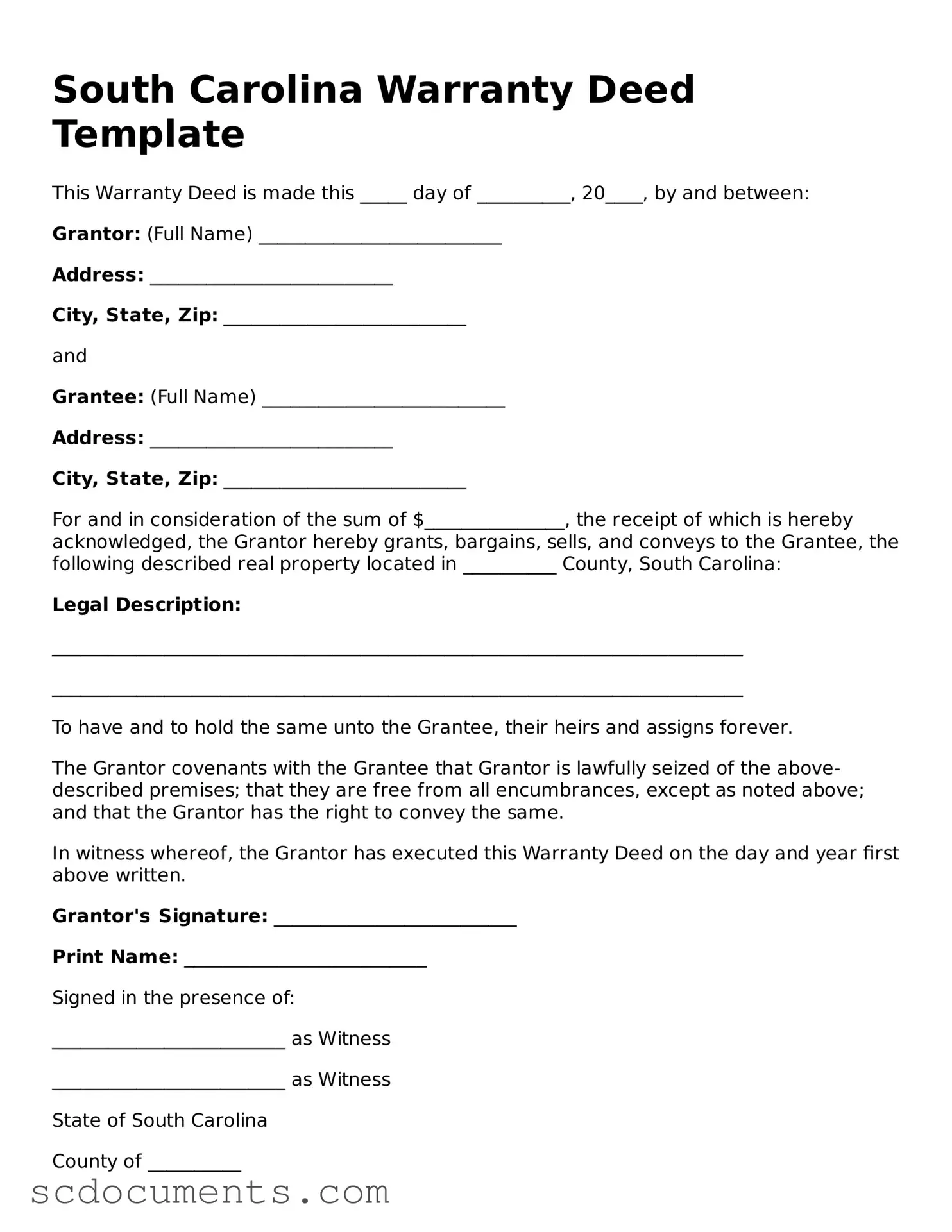Legal South Carolina Deed Form
Dos and Don'ts
When filling out the South Carolina Deed form, it's important to follow certain guidelines to ensure accuracy and compliance. Here are six things you should and shouldn't do:
- Do double-check all names and addresses for accuracy.
- Do ensure that the legal description of the property is complete and precise.
- Do sign the deed in the presence of a notary public.
- Do keep a copy of the completed deed for your records.
- Don't leave any fields blank; fill in all required information.
- Don't use correction fluid or tape on the form; any errors should be crossed out and initialed.
File Data
| Fact Name | Description |
|---|---|
| Purpose | The South Carolina Deed form is used to transfer ownership of real property from one party to another. |
| Types of Deeds | Common types include General Warranty Deed, Special Warranty Deed, and Quitclaim Deed. |
| Governing Law | The South Carolina Code of Laws Title 27 governs property transfers and deeds. |
| Notarization Requirement | All South Carolina Deeds must be notarized to be legally effective. |
| Recording | Deeds must be recorded in the county where the property is located to provide public notice. |
| Consideration | A deed must specify the consideration, or payment, involved in the property transfer. |
| Grantee and Grantor | The deed must clearly identify both the grantor (seller) and grantee (buyer). |
| Legal Description | A legal description of the property must be included to ensure clarity in the transfer. |
| Tax Implications | Property transfers may have tax implications, including potential capital gains tax. |
Documents used along the form
When transferring property in South Carolina, several forms and documents may accompany the deed to ensure a smooth transaction. Each document serves a specific purpose and helps clarify the terms of the transfer. Below is a list of common forms used alongside the South Carolina Deed form.
- Title Search Report: This document outlines the history of the property’s ownership and any claims or liens against it. It helps buyers confirm that the seller has the right to transfer the property.
- Affidavit of Title: This sworn statement by the seller declares that they hold clear title to the property and that there are no undisclosed liens or encumbrances.
- Settlement Statement: Also known as a HUD-1 form, this document details all financial aspects of the property transaction, including costs, fees, and credits for both the buyer and seller.
- Property Disclosure Statement: Sellers are often required to provide this form, which discloses known issues with the property, such as structural problems or environmental hazards.
- Affidavit of Gift: This legal document is essential when transferring personal property as a gift in Missouri, ensuring the transaction is recognized formally. For more information, All Missouri Forms can provide valuable resources.
- Power of Attorney: In cases where the seller cannot be present for the transaction, this document allows another person to act on their behalf in signing the deed and other necessary documents.
- Tax Certification: This form verifies that all property taxes have been paid up to the date of the sale, ensuring that the buyer does not inherit any tax liabilities.
- Bill of Sale: If personal property is included in the sale, such as appliances or furniture, this document outlines the items being transferred and their condition.
These documents play a crucial role in the property transfer process. They help protect both the buyer and seller by ensuring that all legal requirements are met and that the transaction is transparent. Properly preparing and reviewing these forms can prevent disputes and facilitate a successful transfer of ownership.
Key takeaways
When filling out and using the South Carolina Deed form, it’s important to keep several key points in mind. Here are some takeaways to help you navigate the process:
- Understand the Types of Deeds: South Carolina has several types of deeds, including warranty deeds and quitclaim deeds. Each serves a different purpose, so choose the one that fits your situation.
- Provide Accurate Information: Ensure that all names, addresses, and legal descriptions of the property are correct. Mistakes can lead to issues later on.
- Signatures Matter: All parties involved must sign the deed. If the property is owned by multiple people, make sure everyone signs.
- Notarization Required: The deed must be notarized to be valid. This means a notary public needs to witness the signatures.
- Filing with the County: After completing the deed, it must be filed with the county clerk's office where the property is located. This step is crucial for public record.
- Pay Attention to Fees: There may be filing fees associated with submitting the deed. Check with your local county office for the exact amount.
- Keep Copies: Always make copies of the completed deed for your records. Having a backup can be helpful if you need to reference it in the future.
By following these guidelines, you can ensure that the deed process in South Carolina goes smoothly.
Other South Carolina Templates
Sc Homeschool Laws - A means of affirming educational rights within the community.
Is South Carolina Community Property State - Requires both parties' signatures, indicating agreement to the terms.
For those seeking to take control of their future and ensure their wishes are followed, the process of establishing a power of attorney is vital; you can find more information about this essential legal document at https://georgiapdf.com/power-of-attorney.
How to Get a Purchase Agreement - Both parties usually have the right to negotiate the terms before finalizing the agreement.
